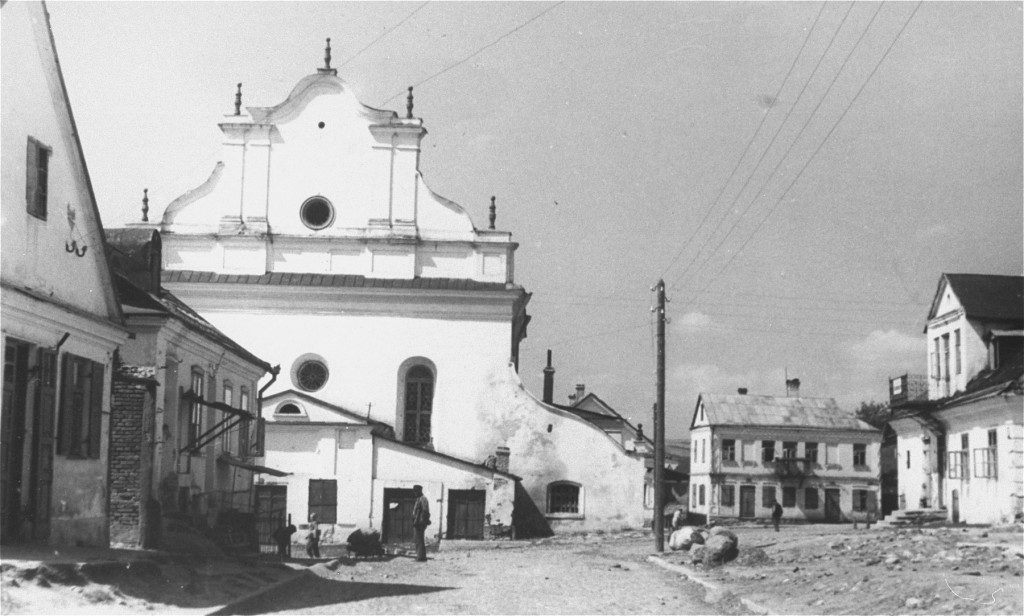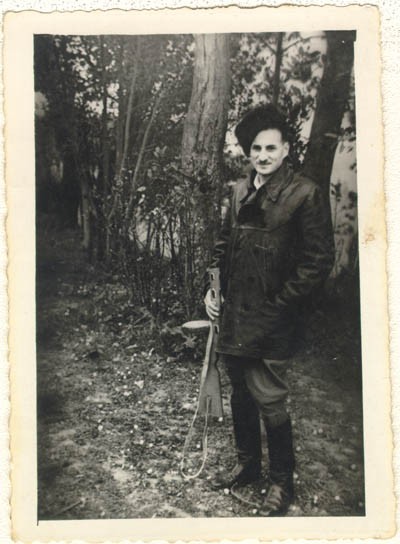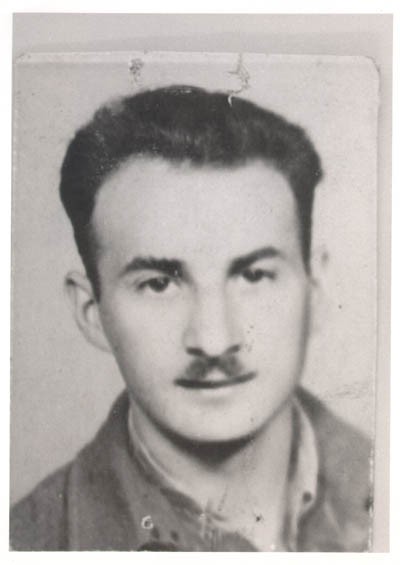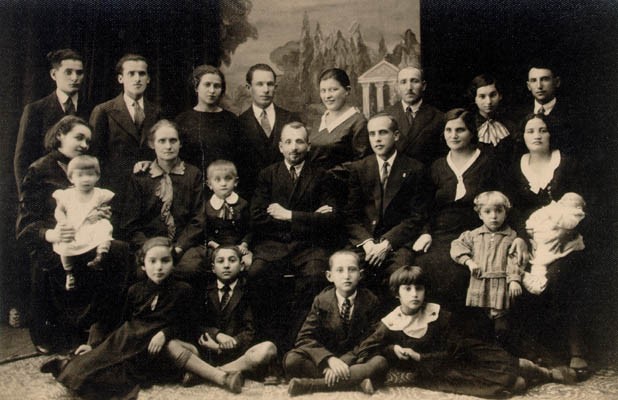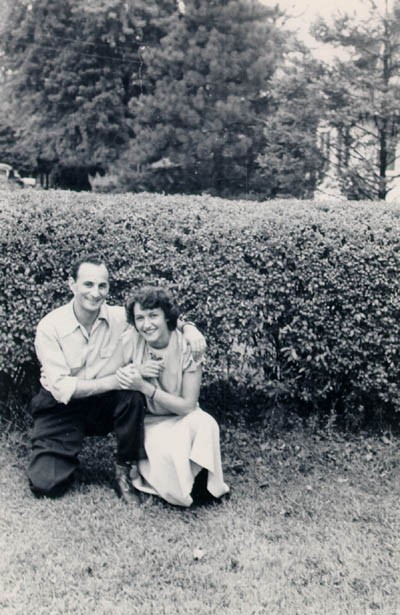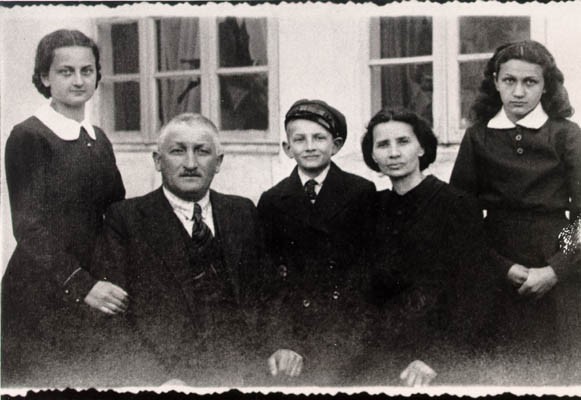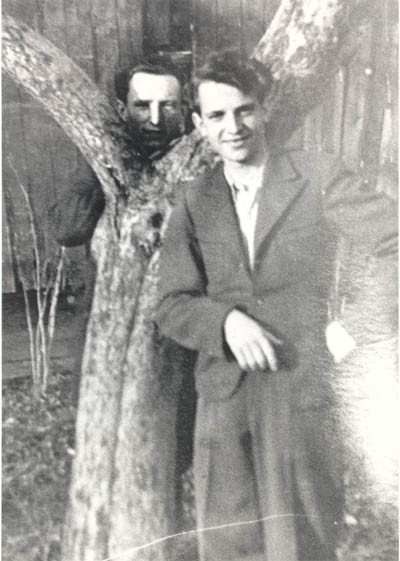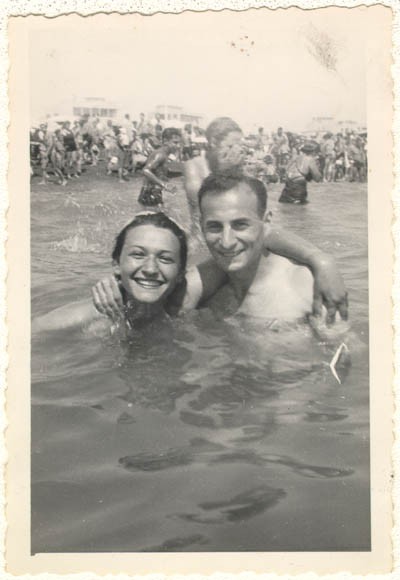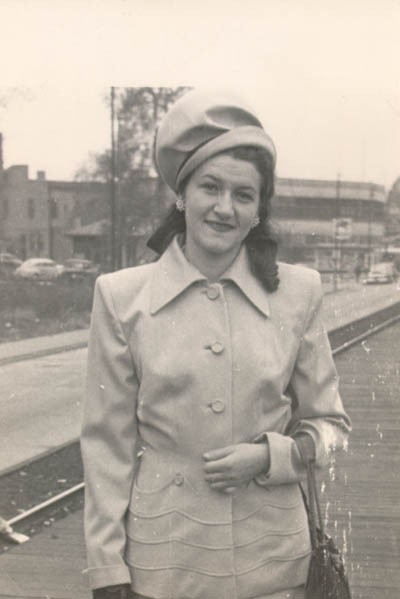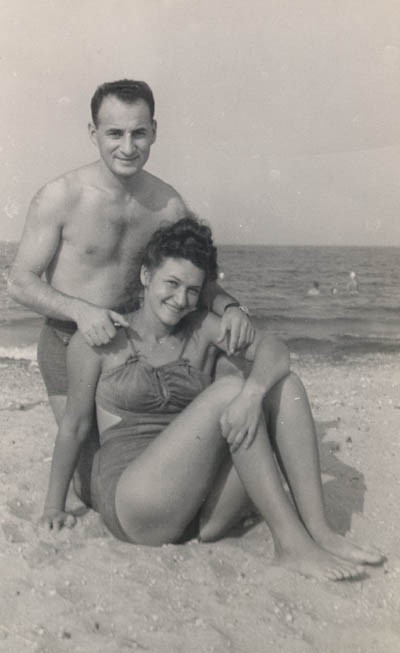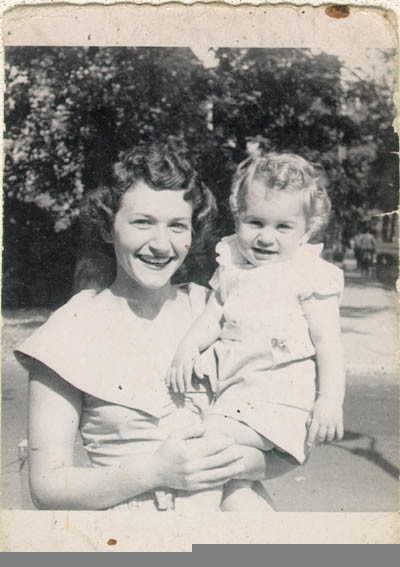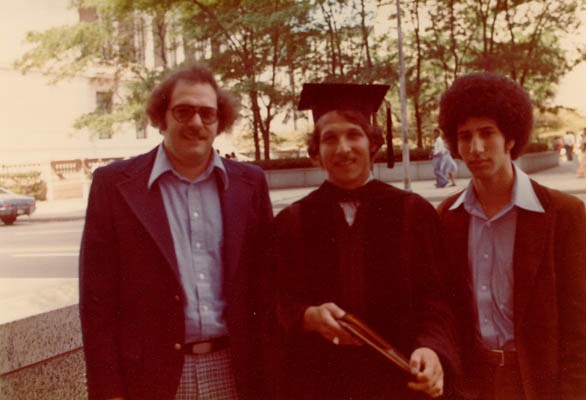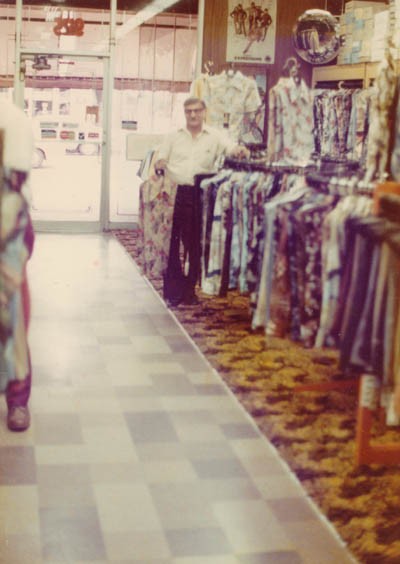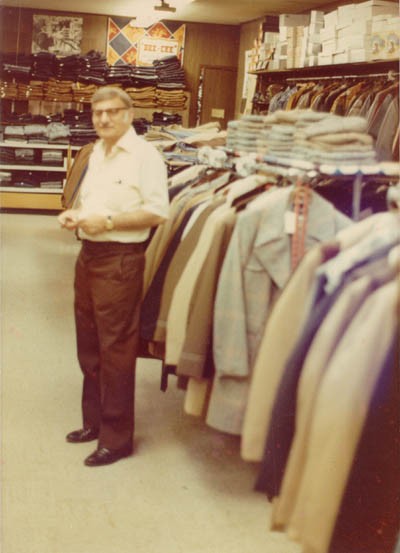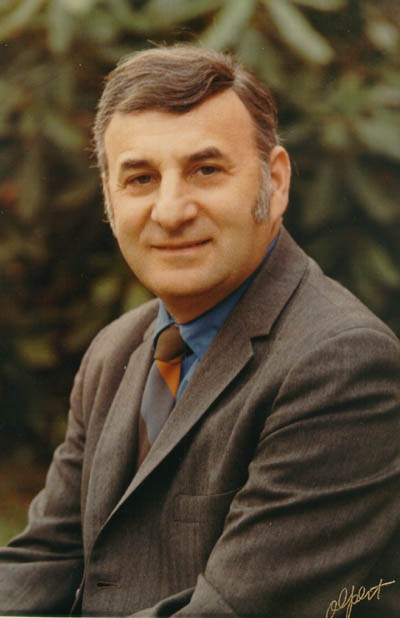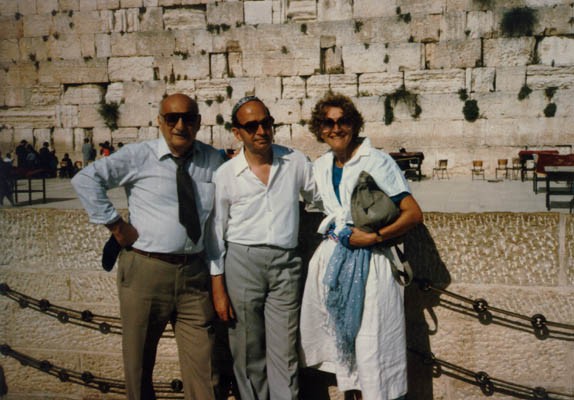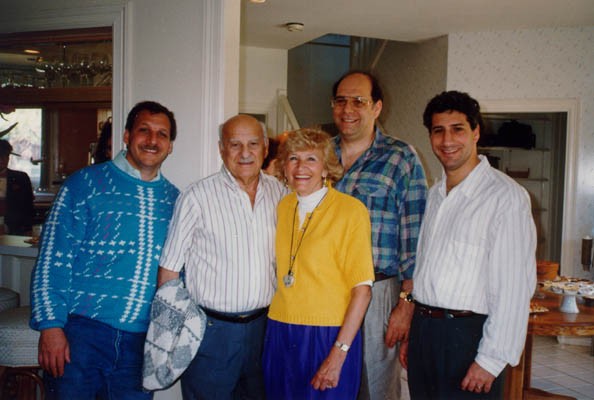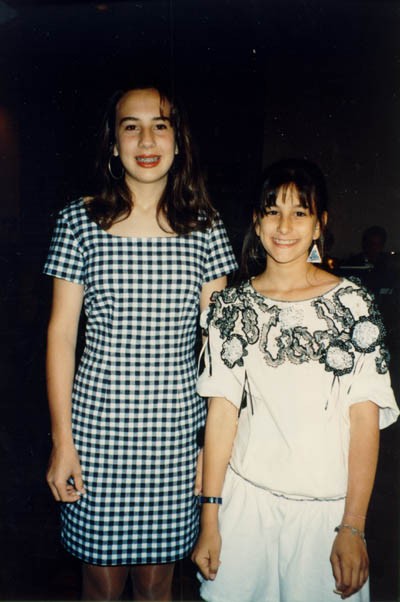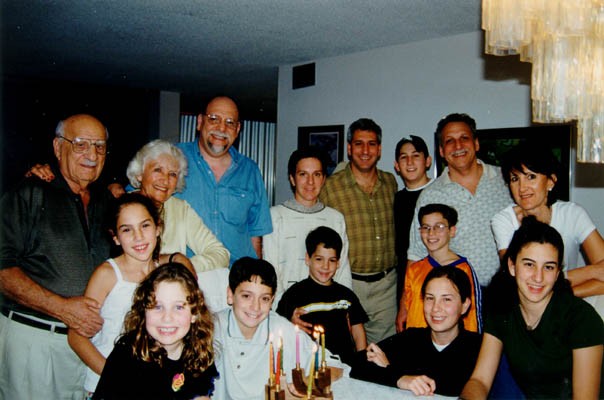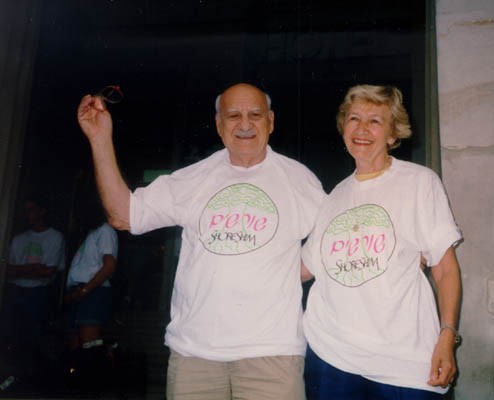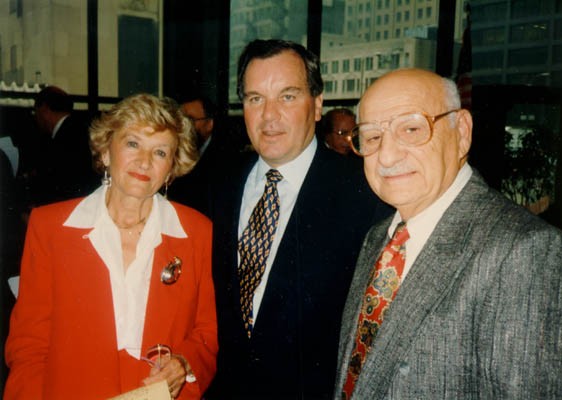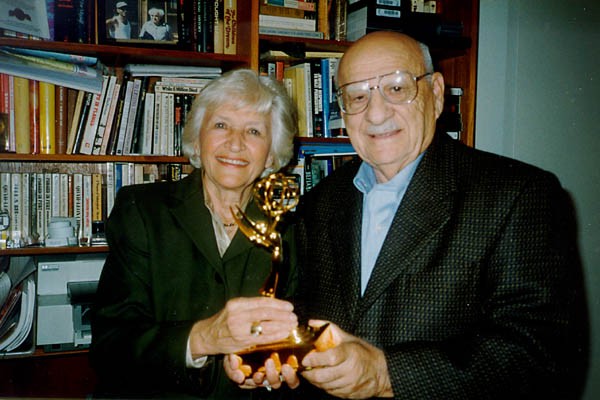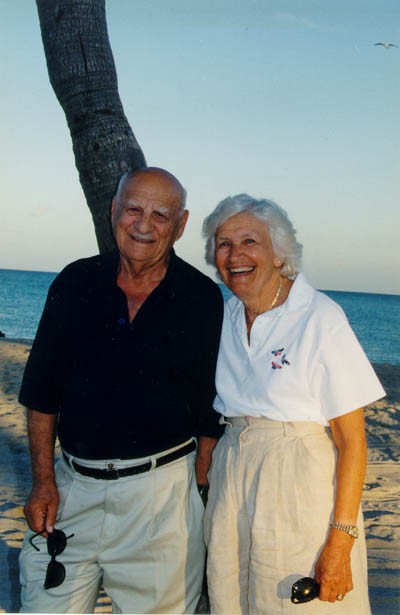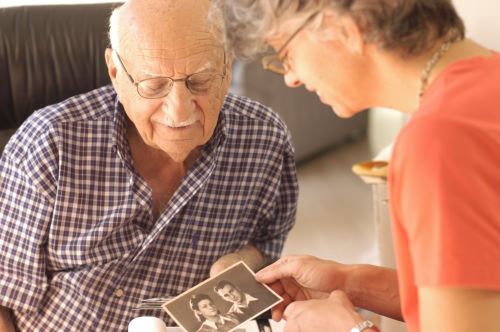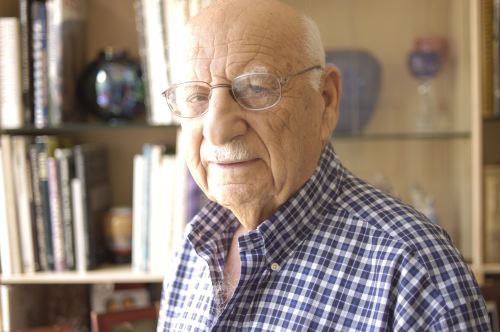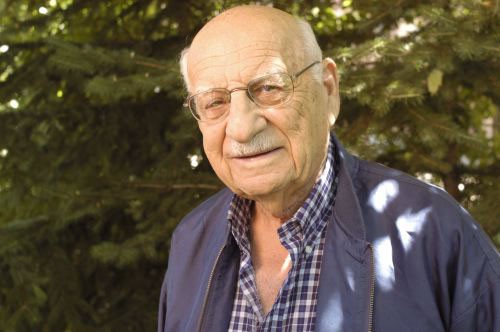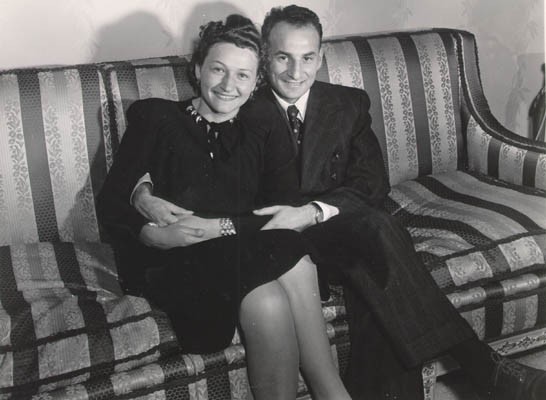
Life After the Holocaust: Aron and Lisa Derman
With the end of World War II and collapse of the Nazi regime, survivors of the Holocaust faced the daunting task of rebuilding their lives. With little in the way of financial resources and few, if any, surviving family members, most eventually emigrated from Europe to start their lives again. Between 1945 and 1952, more than 80,000 Holocaust survivors immigrated to the United States. Listen to Aron and Lisa Derman's story.
Life After the Holocaust documented the experiences of six Holocaust survivors whose journeys brought them to the United States, and reveals the complexity of starting over.
Aron and Lisa met in 1941 in the ghetto of Slonim in occupied Poland, where the Germans had forced all of Slonim's Jews to live. Aron was 19, Lisa 15. Both had survived a massacre that claimed the lives of more than ten thousand of Slonim's Jews. They both joined the underground resistance against the Germans. After the war, they immigrated to the United States.
Listen to Aron and Lisa's Story
Transcript of Interview with Aron and Lisa Derman
Narrator: March 1947. The SS Marine Shark, a refurbished army transport vessel, on another trip across the Atlantic Ocean. Among the hundreds of European refugees on board were Aron and Lisa Derman.
Aron: Now if you would like to find out what kind of a ride we had with it... (Lisa: Oh...) It was real, real hard. Small boat they gave us and a boat with no facilities. No, the conditions were not too pleasant. With bunks. And it was all stormy, and all of us where sick. And Lisa was...
Lisa: I was deathly ill for seven days. The women were separated from the men. And most of the women in my cabin were Italian wives that were joining their husbands. And when the boat - when it was so rough on the sea, everybody went down to pray. I was so sick, I have not been able to go down to pray. So they screamed at me that I am anti-Christ and that I am going to bring down the boat. And they really dragged... tried to drag me down! I was so sick and I wished death on myself. I said, after all of this that I went through in life, now this? When will it ever end? When will it ever end...
Narrator: Six years earlier, in 1941, they had met in the ghetto of Slonim in Poland, where the Germans had forced all of Slonim's Jews to live. Aron was 19, Lisa 15. Both had survived a massacre that claimed the lives of more than ten thousand of Slonim's Jews; Aron and his family by hiding outside of the ghetto; Lisa and her sister by finding shelter with a Polish Christian woman. In June of 1942, after another massacre in which almost all of Slonim's remaining Jews were killed, Lisa and Aron escaped the ghetto together. They sought refuge in the Grodno and Wilno ghettos before escaping, in 1943, to the Narozh forests of Belarus to join one of the partisan units. For one year, they took part in sabotage and armed combat missions against the Germans. Tended to the wounded and the sick. Stood guard in sub-zero temperatures and dreamt of going to Palestine. Scoured for food, and sang partisan songs around the fire.
[Sound of partisan song ("Zog Nit Keyn Mol") is heard]
Narrator: (translates) "Not with lead was this song written, but with blood; it wasn't warbled in the forest by a bird. But a people, trapped between collapsing walls, with weapons held in hand - they sang this song."
Narrator: Revenge was a powerful motivator for survival.
Aron: We had had very strong emotions, and ah - I didn't think twice to be able to go in there and fight, and if you would kill some of the Germans. And we felt - we felt that finally it came the time, and now we were masters of the situation and we had a chance to kill some Germans, we did.
Lisa: In the war this is really regardless of what your thoughts are about other people. It's either the Germans or us. And there was no question that all of us by this time lost all of our families. And it was such a tremendous pain that still was so fresh...
Narrator: When their unit met the Russian army some time in June of 1944, it was a day of mixed emotions.
Lisa: Because when all these units came together, there were other people that we know that were in different units. And, "Oh my God, you survived!" And, you know, you fell on people and kissing them and hugging them. But, you know, a lot of people at the very same time said, "Oh, but look at, look at my parents, my sisters, my brothers, nobody survived. I have absolutely no one."
Narrator: But the war was not over. Russian commanders ordered all surviving partisans to the front. Aron and Lisa secured a special permit that allowed them to return to Slonim briefly, before they were supposed to join the rest of the partisans.
Aron: Well, when I came to my hometown in Slonim, I stayed there for only a few hours. Because immediately I found out that nobody is alive and I couldn't find anybody. Only thing, I met up with one Jewish fellow... and he was telling me that nobody - no Jews are here in the whole town. And we had a city or a town of maybe 20, 22,000 Jews. And here you come in and nobody is there. It's undescribable. You're coming to... I don't know, you're coming like to a cemetery. You're not coming to any place. And it's very, very painful. It was one of my worst days coming in. And that's why I never went back, 'cause the memories of what's left over is unbearable. So, you're better off you don't touch that ground.
Narrator: Meanwhile, Lisa went to the house of the Christian woman who had provided shelter for her and her sister three years earlier.
Lisa: So, I went to tell her that I survived. So I came to her house. We knocked on the door. She opened the door, and I was so grateful that she was alive and that she still lived there... And ah - and she said, "You were a child when you left my house. You look so grown up." She kissed and hugged and cried, because I told them my sister did not survive... She didn't know there were any Jews at all that survived.
Narrator: They didn't return to the front as ordered, but headed for Bialystok instead - a city that served as a center for refugees.
Lisa: There was immediately a committee and the Joint Distribution [Committee] from America established a kitchen where survivors came and got food. And there where lists of people on the walls. Whoever survived signed his name and he signed he's looking for families, looking for so and so. It was so beautiful to see the camaraderie, how people tried to help one another. And - and how people cried when they found somebody that they knew - not only relatives but friends, remote friends, people that lived in the same town in the same shtetl and such. Now some of the people that were with us in the underground, were in Bialystok, too... So, everybody drifted, and your friends became your family. It was your extended family. You were like brothers and sisters. Whatever they had to eat they shared with you. You did the same with them, in clothes or in anything.
Narrator: They got in touch with the Beriha, an organization formed by Jews who had survived the war. Its goal was to help other surviving Jews get out of eastern Europe and into the west, from where they could ultimately make the - “illegal” - journey to Palestine. Aron and Lisa became two of the hundreds of thousands of Holocaust survivors who were helped by the Beriha. First stop, Hungary.
Lisa: We were taken to the magnificent synagogue in Budapest, we were provided there with lodging. Everywhere we went, we met the Beriha. The Beriha arranged it in such a way for us that we did not have to be on our own. So, we felt very free in Budapest. We walked around. We were exploring. We even tried in - to go in a restaurant to see what kind of food they eat, and what is it like. But we didn't stay there long.
Narrator: Next stop, Graz, Austria
Aron: From there we had to cross part of the Alps.
Lisa: On foot.
Aron: On foot. We had to go to Treviso, Italy. And we crossed the Alps. We had Jewish Palestinian guides. They were scouts helping us to cross. But you had a feeling that you had somebody taking care of you. Yeah, it was a good feeling you had.
Lisa: And also it was very exhilarating because some of the people, the guides that were doing it, were Palestinians, Jews that came from Palestine. Who would ever think that people from the ghetto will meet up with Jews from Palestine?! And the idea and the thought were so tremendous, you never thought about the danger.
Narrator: On the other side of the Alps, members of the Jewish Brigade - part of the British army - waited with trucks and food. Lisa and Aron went from Treviso to Bologna to Modena to Florence. In Florence they began receiving packages with food and clothes from American relatives.
Aron: You didn't need much.
Lisa: We didn't need - Our needs were just minimal. We enjoyed the freedom. The beauty of the country and the people. And it was warm, you didn't freeze. And it was beautiful.
Narrator: After several months in Florence, in the spring of 1946, they moved to Rome. Stayed with an Italian family. Got married in Rome's majestic synagogue. Learned Italian. And enjoyed life in a big city.
[Music is heard, (Verdi, "Un ballo in maschera." 1948 recording.)]
Aron: We were introduced to art, going to museums. Then we were introduced to opera. All of a sudden we liked opera. And music. We used to walk around during the evening, during the night, it was a free place for us. We used to go to sleep two, three o'clock every morning! Stopped in cafes. We didn't have the money to spend in cafes, so we stayed outside and listening. And it was a joyful time. A very joyful time!
Narrator: When they received requests from American relatives to come to the US at least for a visit before going to Palestine, they agreed.
Lisa: And finally, we sort of were approaching New York. The ocean wasn't so rough. And Aron came down and he said, "Go down, go down, go down” and - and “come out. Maybe it's - so many people already are out looking, looking out."
Aron: People are getting dressed up (Lisa: People - Oh yes, yes...). Whatever they had. I mean, they got dressed up and here we're coming and we're seeing the shores. It's the evening, so you see the lights. And then you see, after you come closer, and you see the cars, one after the other going. That was like a miracle. That was something like... we saw movies before, but that was something like from... we couldn't believe that's - that's happening, you're coming to the shores of New York.
Lisa: It was a huge place with thousands, really hundreds of people to meet. Seemed like a whole city came down. Maybe there were other boats, too, that arrived. And um - my family in New York, my father had two brothers and a sister in New York, and they came to meet us...
Aron: Two aunts, my aunt and your aunt came...
Lisa: Aron's aunt from Indianapolis, my aunt Blanche from Chicago, and also my cousin that I knew that left for the United States in 1938 came...
Aron: to the boat...
Lisa: So many of the relatives... Can you imagine? When you came from such devastation where everybody was killed and you fell into arms of your own blood, your own relatives. That just was so warm and so wonderful. Until this day I think about it - I think about it how wonderful it is to have family...
Narrator: Did they speak about their wartime experiences?
Lisa: Do you know, in New York, I only... we only told them when they asked about people if they survived. We only told them that. They knew that we survived and sort of... And I - in a short way we told them that there were steps of survival, that Christians helped us, that we were in the underground... liberated... and then we had to go through borders. But not in detail, no, no...
Aron: They were afraid to hurt our feelings. They thought that if they'll start talking about it, they don't know how we're gonna react. (Lisa: Exactly...) So, they felt better they're not going to touch it. Whatever you want to say, you'll say. And little by little you... (Lisa: You revealed some of it.) You revealed some of it. But they didn't press to anything. And we weren't maybe so anxious to tell 'em all the details. But ah... soon, they found out.
Lisa: And they kept on telling it over and over again, this is America... this is America... this is America. Things will be different here, things will be good.
Narrator: After family visits in New York and Indianapolis, they decided to settle in Chicago - in a Jewish community that was proud of them. Part of that pride stemmed from Aron and Lisa having spent much of the war not in a concentration camp, but fighting with a partisan group.
Lisa: In fact, I have to tell you, that some survivors have told me that - that the neighbors and Jewish neighbors, not Christians, Jewish neighbors, would not let their children play with this survivor's children. And ah - they felt very bad about it, very bad about it. They were not accepted. But, because at that - very early not so much was known and not so many people spoke up, so there was a feeling that the people that were in the concentration camps, there was something... they survived... I don't know, doing what? Eating other peoples' flesh? Or, they are terrible...? I don't know, they are - I really lack to come to the bottom of it why, but it's the truth. That's the way it was. I did not meet up with it at all. I did not meet up. And in fact, everywhere that we went we were sort of quote/unquote like "elite" of survivors.
Narrator: Trying to make a living. At first, Aron worked in a steel mill, where the pay was good but the co-workers unsympathetic.
Aron: Yes, yes, yes! They'd say, "Why are you here? Why didn't you go to Palestine?" And then all different kinds of remarks, make fun of it; make fun of the gas chambers. And you could feel it. I had a hard time to cope with that. I used to say back. But to a certain extent, you were afraid. You were afraid. So, you couldn't start up a fight. You were the only one Jew in the whole job! You didn't have any sympathy with every- anybody to stand up for you. I had a hard time to cope with that. And I didn't stay there long. I stayed - about six weeks I worked. I said, I didn't come to America to live antisemitism.
Narrator: Temporary jobs as a shipping clerk...
Aron: And all minimum wage, 90 cents. And I could see it's no future.
Narrator: Doing piece work in a sweat shop - sitting next to a friend, but with no time for talk.
Aron: This picture I can never forget in my life. Here's 100 degrees. Flies all the way around, and I'm working on a machine, and he's working on a machine. And here a fly, he goes like this (claps)... and sewing with the machine. And I say come on! (laughs) It's not for me... He doesn't have a minute time to talk to me! He said, "We'll talk later." It was 12 o'clock, I went out for lunch and never returned. I never came back. You see, it was not for me.
Aron: You're still dreaming about going back to Palestine - going to Palestine. But now - that was '47. The borders were still closed. You couldn't come into - you couldn't get a visa to go to Palestine. 'cause the states - the state was born in 1948! So by that time we were already a year and a half, two years living in America... So, little by little you get used to it and you stay. And - and you stay!
Lisa: And then in 1949, our son was born. And then in '52 our other son was born...
Narrator: Seizing opportunities and ready to take financial risks, Aron tried to establish a business, dry goods store... army surplus store... sporting goods store... Finally, in the early 1960s, a men's clothing store brought financial security and satisfaction. The store, "Howard's," was named after their oldest son. Lisa raised the children.
Lisa: When the children were little and small I felt that my place is home with them. If we live to have children I really felt I have to be with them and protect them and give them absolutely everything - all the love and affection that I too received as a child. I grew up in a loving family that - with a grandma, with all the love and an aunt that lived with us. And when they started going to school I became involved in the PTA and I wanted to know exactly how they were doing and how they were doing and what. And then they were going to Hebrew school. There were sessions, and I'm driving them to school and driving them to school. We always tried to instill them with positiveness. I mean, what kind of a positiveness when you talk about killing and gassing and maiming and all this? We come to it and to say that with all of this terrible things that went on, there were still good people. Look, there were two outstanding Christians that saved your parents. So it's your - You sort of have to search. Within searching you will find good people. And try to emulate the kind of good people that you can find. The second thing that they learned from us, what is it that's important in life? That it's not material things. And ah - I said look, look, your father and I came to America and we picked up... We got educated on our own. Even though we had help from the family and everything. And we lived to see the State of Israel established, which to us is a tremendous, tremendous source, really an emotional source, a psychologically and everything - it's great! Don't despair. Handle right. Don't make - don't overdo that everything is a tragedy, that the ceiling is falling... Look, I said, what we went through! And because I expect you to do it, see - see the positiveness in everything - they do. They are positive people.
Narrator: All three sons became medical doctors; neurologist, internist, and plastic surgeon.
Lisa: And neither Aron or I ever felt guilty for surviving. And other people have a guilt. I don't know why, but they do.
Aron: Many times we talk to each other, and we wonder why...
Lisa: why people are guilty...
Aron: why people feel guilty. I - I don't know.
Lisa: But it's a fact.
Aron: It's a fact.
Lisa: I know that my parents, most of all, most of all in their life wanted us to live! If only I could tell my mother that I survived, how happy she would have been to know that I survived. My father, too. That's all he wanted us is to live, is to live. So why should I feel guilty?
Narrator: Speaking about their experiences and teaching the Holocaust to young people, has become the overriding passion in their lives. Both are active members of the Holocaust Memorial Foundation in Illinois. Both are sought out as speakers about the Holocaust, and especially the Jewish Resistance. In 1993, the Dermans went on a trip to Poland - accompanied by over 100 high school students.
Lisa: Friday morning we went to Lublin. We went to the famous Yeshiva in Lublin and then from there we went to Majdanek. On the way, the children just came from America, you know, with these big boom boxes, throwing candy and having fun. Which, I mean, it's expected of teenagers, why not? Do you know, when we left Majdanek, it was such a silence on the bus. They were cradled in - their heads in one another, in each other, without a sound. They were so taken and so affected. And ahm... they were different people. They were different people when they left. They became so caring, such wonderful people while we were there. How they cared for us - and how they truly lived through this entire episode with us.
Aron: We went to Auschwitz, Majdanek, and Treblinka. And ahm... we gave them lectures for five days. And we spent all the time with them. And we felt that we, we accomplished something. It was worthwhile for the kids to learn special from survivors.
Narrator: Today, Aron and Lisa remain close to their sons and eight grandchildren. And they continue to teach about the Holocaust. Guiding classes through the United States Holocaust Memorial Museum, for instance. Here, children help search for the name of the second Pole who helped Lisa and Aron during the war.
[background noise: audio from Museum exhibits]
Boy: Oh, I found him!
Lisa: You found him. This is the Christian that saved nine Jews, Aron and myself among them. And when we'll come back here again, I will tell you how he saved me. Tell you for you to remember, righteous people... that risked their lives to save others. Why did they do it? Why did they do it? Because they were moral people.
Boy: The moralist of the moral... to help.
Lisa: The moralist of the moral, yes. And also they followed their heart, what their conscience told them to do. Not what the Nazis told them to do. Love thy neighbor! Do not kill! And they did it at a great risk of themselves. You will hear how - what it took for them - for him to save us. And I hope that you as you are growing up will emulate these people, will walk in their footsteps and be righteous people. And together we will maybe be able to build a better world! And when I will be here no more that you will remember what I told you and you will be my survivors and my people - to speak on my behalf. A promise?
Boys: Yes. Yes.
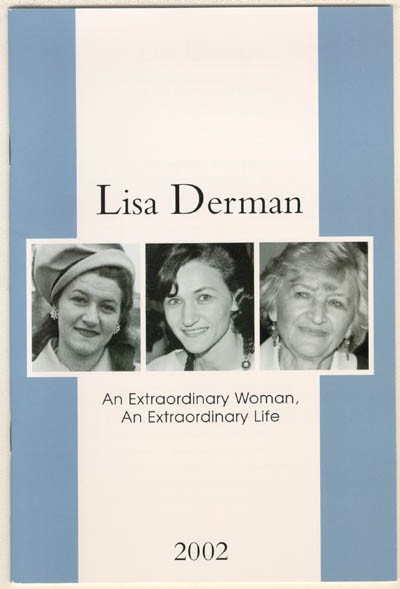
Credits
Narrator: This program is part of "After the Holocaust," a series of audio profiles of Holocaust survivors in America. It was conceived and written by Regine Beyer and Arwen Donahue.
Studio production by Regine Beyer with Helen Thorington, engineer, at the New Radio and Performing Arts studio in Staten Island, New York.
The narrator was Jane Altman.
Special thanks go to the German Radio Archives, DRA, in Potsdam-Babelsberg; to Belgian producer Ronny Pringels, and to German producer Helmut Kopetzky for the use of sounds from their archives.
"After the Holocaust" is a production of the United States Holocaust Memorial Museum.
The interviews in this program were conducted for the Oral History Department of the United States Holocaust Memorial Museum, with financial support by the Jeff and Toby Herr Grant.
The Museum gratefully acknowledges Jeff and Toby Herr for making these interviews and this audio series possible.
Critical Thinking Questions
What challenges faced survivors of the Holocaust?
How did various countries respond to the plight of survivors?


